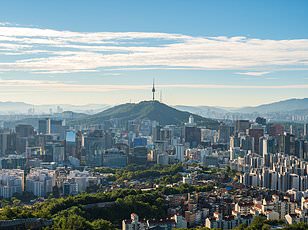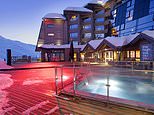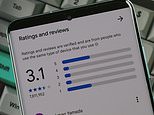EXCLUSIVEI moved from the UK to Seoul - it's safer and you can see a doctor in two minutes (without an appointment)
- Jerry has lived in Seoul since 2015 and shares his experiences with MailOnline
- He explains the ups, the downs and why it's a struggle to get a sandwich
- READ MORE: We live in the world's best city - this is why it's so great
Naming a 'dodgy' neighbourhood in Seoul is a challenge – and valuables can be left on café tables during bathroom visits without fear of having them stolen.
MailOnline Travel is learning from a UK expat in the South Korean capital how his life there differs from his time living in London.
And Jerry reveals that a very low crime rate is one of several eye-opening upsides to Seoul, where he's lived since 2015, along with a stellar health service (he can see a doctor with no appointment within 'a couple of minutes') and cheap high-speed trains.
The UK, apparently, trumps South Korea in the sandwich-making department, though.
When we asked Jerry, who posts on Youtube, TikTok and Instagram as @welcometojerry, what South Korea does better than the UK, he replied: ‘South Korea has extremely low rates of theft and violent crime. As a result, walking the streets in any neighbourhood in Seoul at any time of the day or night is much safer.
'In a recent video, I mentioned how it is difficult to name a “dodgy neighbourhood” in Seoul, but in my hometown of London, I could name a few dozen. Theft is very shameful and very taboo here. You are extremely unlikely to be mugged in South Korea. Locals often leave their valuables on cafe tables whilst they go to the bathroom without a second thought.’
While the crime rate is lower than in the UK, Jerry warned it's important not to be 'too naive when visiting', adding: 'It's good to always exercise caution and not be too trusting of people that you've just met once or twice.’
The high-speed rail network, meanwhile, is seen as a 'necessity' and makes covering long distances a cinch.
He explained: 'I find it very unfortunate that high-speed rail is such a controversial issue back in the UK. Here in South Korea, and the rest of the East Asia region, it is a necessity.

Jerry moved to Seoul (above) in 2015. He told MailOnline Travel what it's like to live there


Jerry revealed that a very low rate of crime is one of several eye-opening upsides to Seoul. He also explained that there are 'endless opportunities for eating out'
'Since 2004, South Korea has built five high-speed rail lines called the KTX, serving 60 stations across the country. I often take the famous "Train to Busan", which connects Korea's two largest cities, Seoul and Busan, in as little as two hours 15 minutes for a ticket price of around £33 ($42).’
And why does Jerry also love the South Korean health service?
He remarked that the 'top-notch' system is set up to keep people in good shape for work, explaining: 'Korea has an interesting public health system called the NHIS, which is intertwined with the private sector.
'My British viewers are usually surprised to learn that when we have a common cold in South Korea, we are expected and encouraged to visit the doctor for some sort of remedy, to get back in fighting shape for work.
'If I have a cold, I can walk into my local doctor's office with no appointment, be seen within a couple of minutes, and walk out with some sort of prescription to treat the symptoms. The whole thing will cost me less than £5/$6.41 with insurance.’
Another upside is housing, which is 'far more affordable than in London’, according to the expat.
He explained: ‘For British people in Korea, you'll find that housing here is relatively affordable. There are many types of single dwellings called “villas”, or “one-rooms”, that can be rented on a monthly basis.
'If you work in Korea, your company will provide this type of housing as part of your pay package. Korea has a unique rental system characterised by a very high deposit and very low rent. Deposits are usually 5-10 million won (£2,769/$3,466- £5,539/$6,932) for a studio apartment with monthly rent 600,000-1.2m won (£332/$415-£664/$831) per month.’
The downsides
On the flipside, Jerry told MailOnline that many of the 'major challenges' for British people living in South Korea 'stem from the work culture'.
He revealed: ‘Whilst many people who come to work in South Korea end up in good positions, you can also read about a lot of horror stories and maltreatment by companies and managers. The UK tends to have a lot of protections for workers against mistreatment and discrimination but working abroad, you can find yourself in a vulnerable position.’
The UK also beats South Korea on sandwiches, said Jerry, explaining that ‘it’s very difficult to find a good sandwich in South Korea, or at least what a British person would recognise as a sandwich'.
He added: 'Sandwiches, after all, originate from the UK and we have perfected them!’
Of course, that doesn’t mean there aren’t other enticing culinary treats on offer in South Korea.
Jerry, who often shares his eating adventures on social media and describes himself as a ‘foodie first and foremost’, explained: ‘South Korea has endless opportunities for eating out, whether that's in Seoul's numerous and diverse restaurants or traditional street food markets.’

Jerry often takes the train from Seoul to Busan (above) using South Korea's high-speed rail network

Jerry explained: ‘The American influence on South Korea is incredibly strong due to the USA's continued connection since the Korean War.' He's pictured here tasting Baskin Robbins ice cream
The expat, who moved to South Korea for a study abroad programme, said one of the things he found most surprising about the country is the number of American food franchises, such as Dunkin Donuts and Baskin Robbins.
Jerry explained: ‘The American influence on South Korea is incredibly strong due to the USA's continued connection since the Korean War.’
Although Jerry describes South Korea as ‘a particularly great place to visit in your 20s’ due to its ‘vibrant youth culture’, he added there’s much more to the social scene than nightclubs with plenty to suit every age of traveller.
He revealed: ‘While there are a number of nightclubs that might exclude people over the age of 30, those establishments are not usually the highest quality and you're not missing out on much.
'I recommend my followers seek out higher quality experiences, such as Seoul's numerous luxury cocktail bars or friendly local neighbourhood pubs that serve delicious bar food with soju (a Korean alcohol) and beer.’
Tempted to make the move across the ocean?
Jerry said: ‘I recommend British people who want to explore South Korea and the wider East Asian region come and live here for a while. There are of course certain caveats to that.
'There are so many videos about South Korea online now. British people should do their own research before making the move by watching both my videos, and videos from other creators who talk about life in Korea.’













































































































